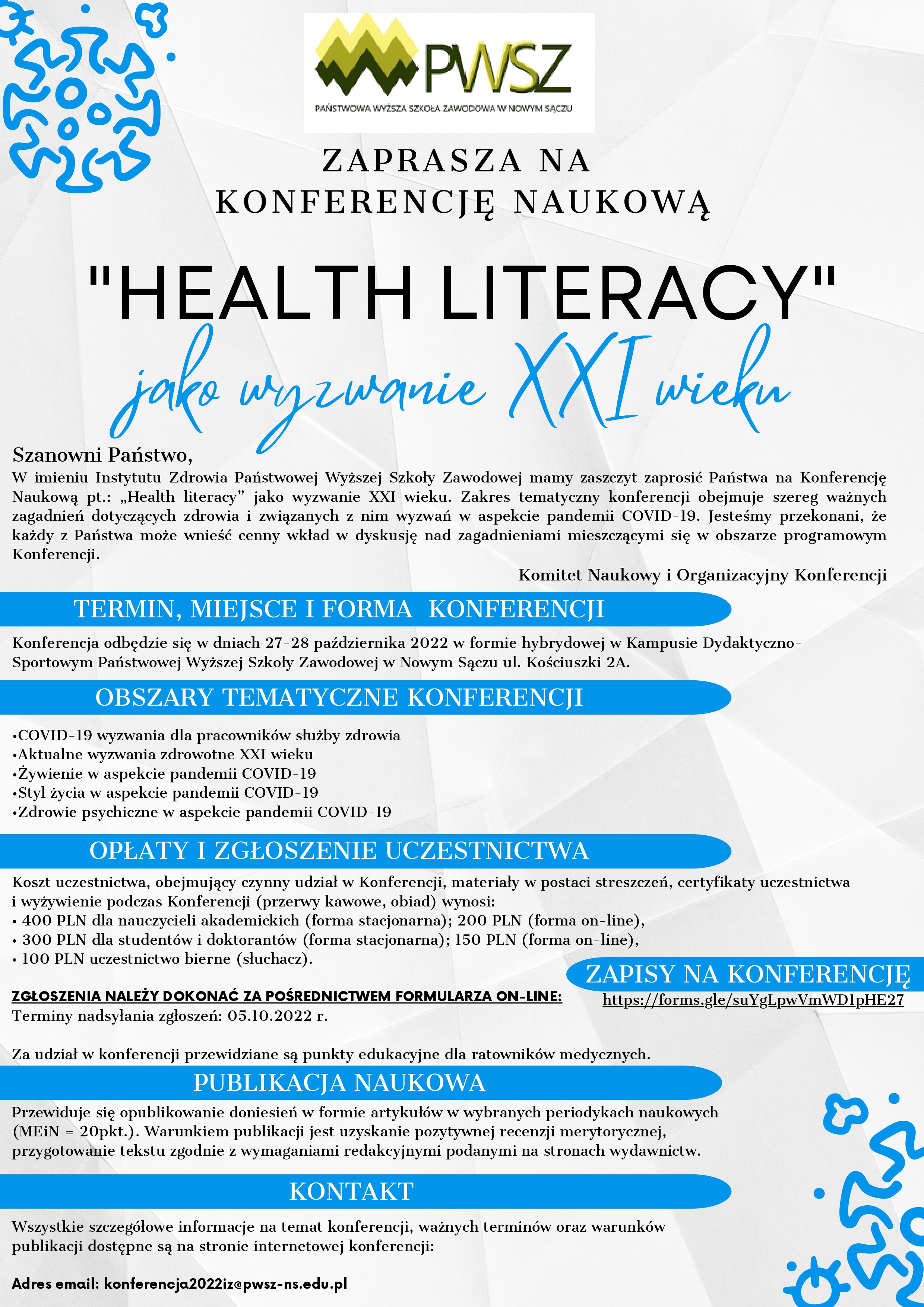The CIA 3.0 and EDE-Q questionnaire as a tool for assessing eating disorders among students of the Academy of Applied Sciences in Nowy Sacz
DOI:
https://doi.org/10.12775/JEHS.2023.13.S2.008Keywords
eating disorders, control, self-criticism, self-esteem, COVID-19 pandemic, body mass index BMIAbstract
Introduction
Eating disorders are a serious problem affecting people of all ages and genders, cultures and origins, affecting not only the physical sphere, but above all the human psyche. In many cases, they are still taboo, as eating disorder issues can often be mistaken for trivialities. Their psychopathology is very complex and it is impossible to pinpoint a single cause. However, it is indisputable that food intake is related to the physiological, but also psychological and social spheres.
The core of psychopathology is a distorted perception of the importance of figure, weight, appearance and their constant control.
Aim
The aim of the study was to determine the scale of eating disorders among students of ANS in Nowy Sącz and the impact of the COVID-19 pandemic on the change in body weight of students.
Material and methods
The research tool was a questionnaire developed on the basis of the EDE-Q 6.0 and CIA 3.0 questionnaires (Christopher et al., 2008), consisting of open and closed questions regarding the perception of the importance of one's figure, body weight, appearance and their control. Based on the students' answers, the body mass index before and after the pandemic was calculated
COVID-19, and also analyzed answers that may indicate problems with nutrition and attitude to your own body. The study was conducted online via the Google Forms online survey platform, in the period from 7 to 21 October 2022, on a representative group of 255 students of the Academy of Applied Sciences in Nowy Sącz.
Results
The survey participants were mostly young women (average age 21.24), undergraduate full-time students, living in rural areas. There were no significant differences in body mass index (BMI) between men and women before and during the pandemic.
In the study group, the question concerning the influence of diet, physical exercise or feelings regarding nutrition, figure and body weight deserve attention, with more than 50% of students indicating the influence of the above-mentioned factors. factors for: critical thinking about yourself, source of nervousness, worry, making you feel guilty, or feeling ashamed of yourself. In the questions regarding the sense of satisfaction with their figure, body weight and appearance, over 50% of students indicated a lack of satisfaction, i.e. a negative perception of themselves in terms of body weight (striving to lose weight, fear of gaining weight, feeling of being fat, limiting amount of food eaten).
Conclusion
Based on the conducted research, it can be concluded that students of the ANS in Nowy Sącz are at risk of eating disorders. It is therefore worth taking preventive measures aimed at raising awareness of the scale of the problem and popularizing the available forms of psychological support in this area.
References
Cichecka-Wilk, M. "Anoreksja niemowlęca–kryteria rozpoznania, etiologia, sposoby leczenia." Studia Edukacyjne 60 (2021): 213-229 https://doi.org/10.14746/se.2021.60.12
Dymkowska-Malesa, M. Zaburzenia odżywiania w świadomości gimnazjalistek, 2016, Nowa Pediatria 4.
Fairburn, Ch. G. Terapia poznawczo-behawioralna i zaburzenia odżywiania. Wydawnictwo Uniwersytetu Jagiellońskiego, 2013.
Farley, D., Golonka, K., Kowalski, J., Legierski, J., & Tucholska, K. (2022). Przegląd metaanaliz badań nad skutecznością psychoterapii poznawczo-behawioralnej w leczeniu zaburzeń psychicznych. Warszawa: Polskie Towarzystwo Terapii Poznawczej i Behawioralnej.
https://mindhealth.pl/co-leczymy/zaburzenia-odzywiania
[dostęp on-line 20.01.2023 r.]
Keski-Rahkonen A., Raevuori A., Hoek H., Epidemiology of eating disorders: an update. Annual Review of Eating Disorders, 2018, CRC Press.
Rzońca E., Bień A., Iwanowicz-Palus G., Zaburzenia odżywiania – problem wciąż aktualny = eating disorders – an ongoing problem, Journal of Education, Health and Sport, 2016, nr 6.
Sikorska I. Ciało i zdrowie w okresie późnej adolescencji. W: A. Brytek-Matera (red.) Ciało w dobie współczesności. Wybrane zagadnienia z problematyki własnego ciała. Difin, 2010, Warszawa, s. 131–148.
Świątkowska, K. W poszukiwaniu skutecznych metod profilaktyki zaburzeń odżywiania: wykorzystanie indukcji dysonansu poznawczego (przegląd literatury). Psychiatria 2021.
Talarczyk M., Anorexia nervosa. W sieci pułapek. Na podstawie wybranych publikacji autorskich, 2019, Silva Rerum.
Wójciak, R. W. "Zaburzenia odżywiania." Mojs E.(red.) Pomoc psychologiczna w chorobach somatycznych, Poznań, Zakład Psychologii Klinicznej UMP (2012).
Zborowski M, Mikulec A. Zachowania żywieniowe studentów Państwowej Wyższej Szkoły Zawodowej w Nowym Sączu podczas pandemii COVID-19. Nauka. Żywność. Technologia. Jakość. 2021; 28, 4 (129), 98 – 110.
https://doi.org/ 10.15193/zntj/2021/129/403.
Downloads
Published
How to Cite
Issue
Section
License
Copyright (c) 2023 Natalia Wcisło, Natalia Potaczek, Marek Zborowski, Anna Mikulec

This work is licensed under a Creative Commons Attribution-NonCommercial-ShareAlike 4.0 International License.
The periodical offers access to content in the Open Access system under the Creative Commons Attribution-NonCommercial-ShareAlike 4.0
Stats
Number of views and downloads: 1630
Number of citations: 0



